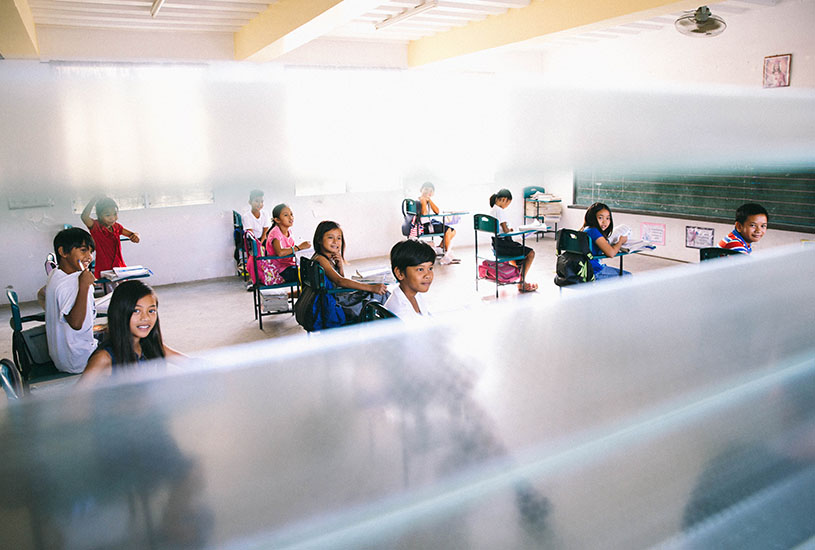With the right strategies, teachers can significantly improve self-perception, motor competence and, ultimately, physical activity in teenage girls – leading to life-long benefits, according to new Deakin research.
Belief in themselves plays a crucial role in girls’ involvement in physical activity. In a world-first study on the benefits of “mastery” teacher strategies in physical education, Deakin researcher Dr Natalie Lander has found teacher-led, student-centred approaches in physical education classes can dramatically improve adolescent girls’ general self-perception and, ultimately, increase physical activity levels.
Girls around the world are significantly less active than boys, experiencing an 83 per cent decline in physical activity as they transition into adolescence.
Research has shown that two key influencers that lead to engaging in physical activity are positive self-perceptions and motor skill proficiency. Notably, both perceived and actual motor skill competence are lower in girls than in boys.
In a randomised control trial of 171 Victorian girls, Dr Lander’s project involved upskilling PE teachers through on-site consultations so they could lead a 12-week intervention that aimed to improve the girls’ general self-perception, perception of their abilities and their actual abilities.
The intervention focussed on developing a teaching approach that set up a “mastery climate.” Girls were placed at the forefront of their learning, with ownership of their own decisions through a strong understanding of the what, how and why they needed to learn specific abilities and motor competencies.
“It was a student-centred approach that fostered the girls’ intrinsic motivation, allowing them to assess themselves, to determine what needed to be improved, why and how, and also to understand and value the benefits of undertaking this effort,” said Dr Lander, who is based within Deakin’s Institute for Physical Activity and Nutrition, and School of Education.
“The trial achieved significant benefits to girls’ general self-perception, physical self-perception, perceived motor competence, and their actual motor competence,” she said.
[testimonial_text]It showed that the higher you perceive your ability, the more willing you are to persist. The more you persist, the better your skills get and, ultimately, the more likely you are to be active, and, importantly, enjoy activity.[/testimonial_text]
[testimonial_picture name=”Dr Natalie Lander” details=” Researcher, Deakin’s Institute for Physical Activity and Nutrition, and School of Education”]
 [/testimonial_picture]
[/testimonial_picture]Dr Lander emphasised that physical activity encourages life-long learning and positive health behaviours, with research showing that increased motor competence, higher self-perception of skill and thus higher levels of physical activity may lead to increased cognition, increased persistence in tasks, increased problem solving, resilience, self-esteem, general motivation and academic achievement.
“The intervention was delivered in a way that ensured teachers provided an environment where every single student felt important, valued and safe,” she said.
“Even if a student was performing a skill predominantly incorrectly, it was important teachers still identified and highlighted what was being performed well and communicated the positive aspects of their performance, along with ways they could improve.”
Dr Lander noted that the approach requires very little extra financial investment from schools, but, instead, is a matter of improving teacher competence and confidence through professional development for qualified teachers and improved undergraduate teacher education.
She became passionate about giving girls the belief that they could do anything during her 10 years as a secondary school teacher, working predominantly in all-girls’ schools. As a teacher, she noticed a disconnection between what was often being delivered in schools in physical education and what was needed for girls to engage and improve. This prompted her move into research.
“I wanted to empower both teachers and students with the understanding that Physical Education is not about making ‘sporty’ kids,” she said.
“It’s about creating confident and productive go-getters in our society and about instilling the belief in all students, particularly girls, that they can develop the skills and knowledge to be confident and competent movers, and that being active has so many important benefits that extend across the physical, social and psychological domains.”
The research is now entering a new phase through Deakin’s Cotutelle program, with three PhD students leading an international, multi-site strategy within the UK and Australia. The PhD students will look at how the intervention can be applied sustainably so it can be embedded within national school curricula – targeting all schools, with a particular focus on low socio-economic schools, where perceived and actual skills levels are consistently and significantly lower.
Read more:
- “Can a teacher-led RCT improve adolescent girls’ physical self-perception and perceived motor competence?” “Journal of Sports Sciences.”
- “Improving Early Adolescent Girls’ Motor Skill: A Cluster Randomized Controlled Trial” “Medicine & Science in Sports & Exercise.”
Published by Deakin Research on 11 October 2018



